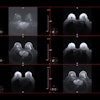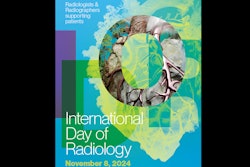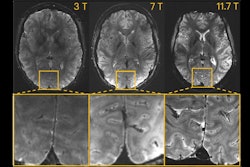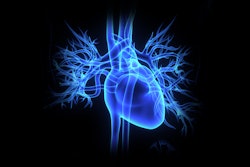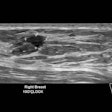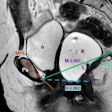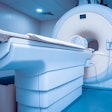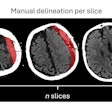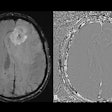Members of Valencia's radiological community are reeling from the worst flooding experienced by the region for generations. Some people have expressed anger over the lack of preparedness and political leadership.
"Work in our hospital, and especially in our radiology department, has been exceptionally challenging throughout this crisis -- and it continues to be so," Dr. Eva Llopis, head of radiology at Hospital Universitari de la Ribera in Alzira, the capital of the comarca of Ribera Alta in the province of Valencia, told AuntMinnieEurope.com on 5 November. "Several radiology rooms were flooded, and it was tough to get them back up and running. Finding staff who could safely reach the hospital during the worst of the storm added another layer of complexity."
After the DANA storm system struck this area of Eastern Spain on 29 October, the damage was widespread, including equipment failure, destruction of roads, train tracks, cars, and the entrapment of colleagues, and patients in life-threatening situations. "We had to navigate it all," she noted. "Colleagues who lost loved ones or everything they owned still managed to persevere. Administrative staff, technicians, nurses, and radiologists all linked arms to ensure that our department remained operational, central to the hospital's efforts."
Some staff members were isolated in their damaged homes or they had to stay in the hospital overnight because their houses were flooded, while others were trapped in their cars for over 12 hours or had to flee to safety until they were rescued, explained Llopis, secretary of the International Skeletal Society and past president of both the European Society of musculoSkeletal Radiology (ESSR) and the Spanish Society of Musculoskeletal Radiology (SERME).
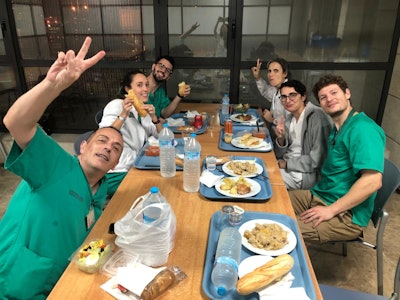 Staff in the radiology department of Hospital Universitari de la Ribera remain upbeat, even though they were unable to return to their flooded homes. Courtesy of Dr. Eva Llopis.
Staff in the radiology department of Hospital Universitari de la Ribera remain upbeat, even though they were unable to return to their flooded homes. Courtesy of Dr. Eva Llopis.
"Despite these personal hardships, everyone worked around the clock to reschedule patients, assist walk-ins in a partially operational department, and at the same time support their communities," she added. "What was truly remarkable was the mutual support between our staff and our patients. In moments of emotional exhaustion, when some of our colleagues were overcome with grief, the patients themselves offered emotional support."
It was deeply moving to witness patients offering comfort to hospital staff, who found solace in these compassionate exchanges. "A comforting hand from a patient can close the emotional circle of mutual compassion."
One of the darkest weeks...
Countless people are still missing, and many families are awaiting the recovery of the bodies of their loved ones, but the political response has been alarmingly inadequate, noted Angel Alberich-Bayarri, PhD, CEO and co-founder of Quibim, the radiology AI software developer with its headquarters in Valencia.
"This has been one of the darkest weeks in the history of our region," he wrote in his weekly email to company employees. "What has happened here is a tragedy of immense scale, with effects that will be felt for a long time to come."
Political leaders have demonstrated that they are out of their depth, having a lack of foresight and understanding, and unable to assess and manage a crisis of this magnitude, Alberich-Bayarri continued.
"Many of those in power, unfortunately, lack the experience to lead effectively in such times. In contrast, it's been the citizens -- our neighbors and community members -- who have come together to help, with spontaneous acts of generosity, resilience, and organization. Firefighters, police, and soldiers, too, have stepped up, acting from their instincts and sense of duty, often without clear guidance," he stated.
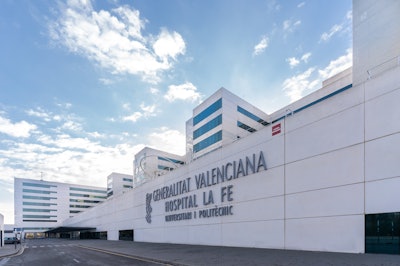 The main entrance building of the La Fe public university hospital in Valencia.
The main entrance building of the La Fe public university hospital in Valencia.
The southern and western parts of the metropolitan area in Valencia are a complete disaster area, with over 210 lives lost and most roads and railways closed, Dr. Luis Marti-Bonmati, clinical director of medical imaging at Hospital Universitario y Politécnico La Fe, told AuntMinnieEurope.com on 3 November.
"We're working on recovery efforts, but it will take months. Our politicians are surely not the best ones to manage this," he said, adding that medical staff are facing great difficulty moving in and out of the devastated area.
Fight for survival
The survivors of this tragedy are deeply affected, but they are not defeated, Llopis emphasized. "Their resilience shows the power of the human spirit and the impact that a positive mindset can have in overcoming even the most difficult situations. This lifts our spirits and gives us hope as we face the long process of rebuilding."
Amid the devastation, the story is ultimately positive -- one of resilience and strength, illustrating how people can work together to face extreme adversity, she said. "After an initial phase of chaos, surprise, and denial, we lived through existential fear, but over time, we entered a new phase of mourning and fighting for our survival."
Volunteers keep morale high by singing the hymn, Benetússer-Valencia. Video clips courtesy of Dr. Eva Llopis.Llopis expressed her deep gratitude for the heartwarming support received from the radiological community during this challenging time.
According to Alberich-Bayarri, "I am certain of one thing: this will be a turning point for our society. This tragedy will demand higher standards of preparedness, accountability, and unity, ultimately leading us toward the creation of stronger and more resilient organizations."



